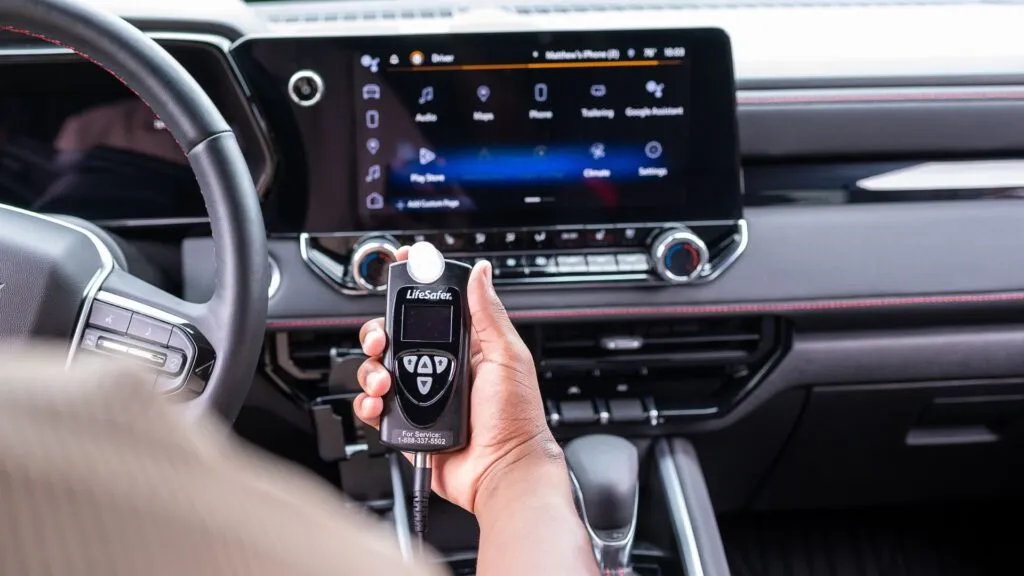Is an Ignition Interlock Device Mandatory After a DUI in Colorado?
If you’ve been charged with a DUI in Colorado, you may be wondering if you’re required to install an ignition interlock device (IID). Understanding the state’s laws around IIDs is essential, as these devices play a crucial role in safely reinstating your driving privileges.
This guide will break down the requirements for an IID after a DUI in Colorado, including changes to the law, what this means for Persistent Drunk Drivers (PDD), and other scenarios like chemical test refusal or multiple violations.
Let’s explore everything you need to know about IIDs in Colorado.

What Is an Ignition Interlock Device?
An ignition interlock device —sometimes called a car breathalyzer or blow-and-go device—is a small, electronic device installed in your vehicle. It prevents the engine from starting until you provide a breath sample to ensure your blood alcohol content (BAC) is below the preset limit.
With constant monitoring during and before operation, an IID ensures drivers stay alcohol-free while keeping Colorado’s roads safe.
When Is an IID Mandatory in Colorado?
For drivers convicted of a DUI, having an IID is often required to regain driving privileges. However, the specific requirements vary based on the circumstances of your arrest and your BAC.
Here’s what you need to know according to the Colorado DMV:
- If your BAC is 0.08 or higher (known as DUI Per Se), you may be required to install an IID.
- Drivers with a BAC of 0.15 or higher are classified as Persistent Drunk Drivers (PDD) and face stricter IID requirements.
- Refusing a chemical breath or blood test automatically triggers an IID requirement, along with other penalties.
The timeline and conditions for installing an IID may depend on the date of your offense as well as your violation history. Changes implemented in January 2023 further impact these requirements.
What Does Persistent Drunk Driver Mean?
A Persistent Drunk Driver (PDD) designation applies to individuals who meet certain criteria indicating higher levels of risk. You will be labeled a PDD if:
- Your BAC is 0.15 or higher.
- You refuse to submit to chemical testing during a DUI stop.
Drivers with a PDD designation face stricter penalties, such as an extended mandatory IID period of two years. Furthermore, they must complete a Level II Alcohol Education and Therapy program as part of their license reinstatement requirements.
Updates to IID Requirements Post-January 1, 2023
Colorado introduced new legislation on January 1, 2023, which modified IID requirements based on the date of arrest. These updates aim to simplify the reinstatement process while ensuring public safety.
Here’s a summary of the changes:
For Offenses on or After January 1, 2023:
- First DUI or Per Se Conviction (BAC < 0.149): You may be eligible to reinstate driving privileges immediately with a nine-month IID requirement.
- First Offense with BAC ≥ 0.15 (PDD): Eligible to reinstate immediately with a two-year IID requirement.
- Second or Subsequent Conviction: Eligible to reinstate immediately, subject to a two-year IID requirement.
For Offenses Before January 1, 2023:
- Eligibility for early license reinstatement typically begins after serving one month of the revocation period. IID terms depend on BAC levels and prior offenses, with durations ranging from eight months to two years.
This streamlined approach helps offenders reintegrate into safe driving practices while maintaining strict oversight for public safety.
Refusal of Chemical Testing
Refusing to submit to chemical testing during your DUI stop introduces additional complications. Under Colorado law, refusal to comply results in:
- An automatic PDD designation.
- A two-year IID requirement for license reinstatement.
Eligible offenders may pursue early reinstatement with an IID after serving a minimum of two months of revocation. However, refusing a test generally limits your options and extends penalties.
Multiple Alcohol Violations
If you have multiple alcohol-related convictions, your IID requirements become more stringent. Here’s how it works:
- For two or more alcohol violations, you’ll be classified as a higher-risk offender, subject to added wait times and longer IID periods.
- Individuals with repeat offenses may apply for reinstatement after a two-month waiting period, provided they comply with conditions, including a two-year IID placement.
This setup promotes enhanced accountability for repeat offenders while offering a path back to responsible driving.
How LifeSafer Supports Colorado Drivers
At LifeSafer®, we understand that navigating DUI consequences and IID requirements can feel overwhelming. That’s why we’ve partnered with the Colorado Criminal Defense Bar to provide reliable, efficient ignition interlock services across the state.
Here’s how we make the process seamless:
- Fast and Guaranteed Installations: Get same-day installation and ensure compliance with state laws.
- Advanced and Easy-to-Use Devices: LifeSafer IIDs are small, discreet, and meet all Colorado requirements.
- 24/7 Support: We’re here to answer your questions and assist with scheduling or troubleshooting.
- Affordable Pricing: Don’t worry about breaking the bank—we offer competitive rates with no hidden fees.
From guiding you through regulations to installing and managing your IID, we’re proud to be your trusted partner on the road to freedom and independence.
Take Control of Your Driving Privileges
Understanding the role of an Ignition Interlock Device in Colorado’s DUI process is a vital step toward regaining your driving privileges. Whether you’ve recently faced your first offense or are navigating the complexities of multiple violations, an IID offers a clear path to getting back on the road safely and responsibly.
